Knowledge For Resilience in the Peace
The cross-commodity podcast series touches on our primary agricultural commodity players including grains, oilseeds, forage seed, forage, livestock and horticulture. Margins in agricultural businesses are often small. Adopting new farming practices can bring a costly learning curve. Having access to knowledge from researchers, experts and peers who have already walked the path of trying a new practice or technology, affords more producers the opportunity to adopt production practices they may not otherwise have implemented.
Episodes
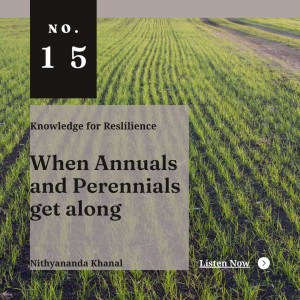
Friday Sep 02, 2022
Friday Sep 02, 2022
Forage seed production is a bit of a strange bird – neither is it an annual crop although it has components of it, like preparing a field for seeding similar to annual crop management, neither is it a true perennial crop although it has components of it – like leaving the same crop for 2-3 years.
Looking at how forage seed crops could integrate with annual crop rotations, is Nitya Kanal
Dr. Khanal can be reached by email nityananda.khanal@agr.gc.ca or by phone 780-354-4264.
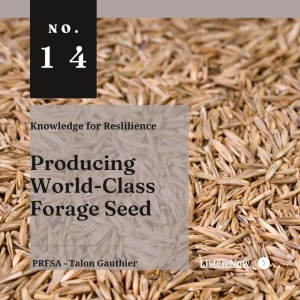
Sunday Jul 24, 2022
Sunday Jul 24, 2022
Did you know that the AB and BC Peace Region is one of the main forage and turf seed producing areas in the world? If you are growing forages or are admiring your lush lawn, chances are good that a Peace region grower was the source of that seed. Here to talk to us today is Talon Gauthier, general manager of the Peace Region Forage Seed Association. The forage seed association is unique in that it spans both the AB and BC Peace region, allowing it to represent producer interests across the region regardless of that pesky little line on the map.
Talon will share a bit more about her background and how she got started with the association as part of our chat. Talon and her husband also farm in the area, so she literally has boots on the ground when it comes to knowing the industry. If you missed previous episodes, you might also enjoy Episode 4 and 9, which Talon will refer to in our discussion . In episode 4, Keith Uloth was sharing details about the Pest monitoring program for forage and grain producers in the BC Peace region, while in episode 9 I talked to Calvin Yoder, who is filling the role of forage seed agronomist in the Peace region.
Peace Region Forage Seed Association
http://www.peaceforageseed.ca
Growth Regulators in Grass and Legume Seed Crops - Overview
http://www.peaceforageseed.ca/pdf/SeedHeads/SH_9_PGR_Overview.pdf
Fort St John Seed Cleaning Coop
https://fsjseedco-op.com
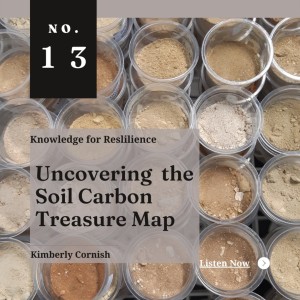
Thursday Jul 14, 2022
Thursday Jul 14, 2022
Soil carbon is probably one of the biggest current buzz words. Although it seems like everybody is talking about soil carbon, we still have a lot to learn about the movements of soil carbon and especially about the dynamics of soil carbon specific to the Peace.
One the people working hard to unearth the soil carbon treasure map of our regions is Kimberley Cornish with the Food, Water, Wellness Foundation. Kim and her team are using a process of using a combination of predictive soil mapping with existing soil information with on the ground 1m deep soil core sampling. A cool but labour intensive process which allows for soil carbon mapping across larger areas at an overall more affordable cost. A pending project hopes to map soil carbon across large areas in the Peace Region to help colour in the local soil carbon treasure map.
Learn more about Food, Water, Wellness Foundation
http://www.foodwaterwellness.org
Dig deeper on the soil carbon measuring approach
http://www.foodwaterwellness.org/soil-carbon-measurement.html
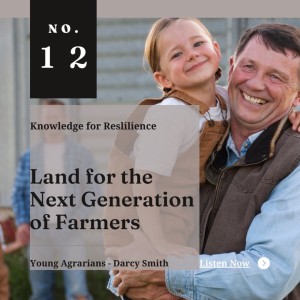
Saturday Jun 25, 2022
Saturday Jun 25, 2022
The BC Young Agrarians help to connect folks who have land available with farmers who are looking for that perfect parcel of land to farm or ranch. The Young Agrarians offer many services beyond their land matching program. Here to give us a behind the scene look is Darcy Smith. Darcy has spent the last decade working to support farmers and food systems. She lives and works on the unceded Musqueam, Squamish and Tsleil-Waututh territories.
As the first land Matcher in BC and now as BC land matching program manager, she’s worked with many new entrants, seasoned farmers and farmland holders across the province, who all share a vision to help the next generation of farmers get on the land and to see the land producing food into the future. Darcy also edits the BC Organic Grower, a quarterly magazine showcasing organic farming across B.C.
BC Land Matching Program page: https://youngagrarians.org/bc-land-matching-program
Non-Family Farm Transition Toolkit: https://youngagrarians.org/bc-transition-toolkit/
Peace Region land matching event onJuly 9: https://youngagrarians.org/july-9-2022-rose-prairie-bc-land-social-at-pure-pastures-regenerative-farm/
Other helpful Links and Contact Information:
morgan@youngagrarians.org
youngagrarians.org/land
youngagrarians.org/events
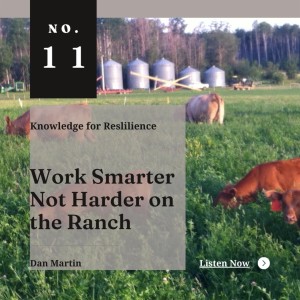
Monday Jun 13, 2022
Monday Jun 13, 2022
Whether you are a billionaire and just farming for the fun of it or not a billionaire and farming to put food on the table, there is one resource all of us get the same amount of, and that is time. 24 beautiful hours in every day. When it comes to farming – no matter the scale – a shortage of time to get it all done is a common challenge. Today’s chat is with Dan Martin, a regenerative minded Peace region farmer who needed to solve the time problem out of necessity. He will share what worked for him, how some of his practices still make the neighbour’s eye brows go up and spots where he is still looking to fine tune his management. If you enjoy stories, stick around as Dan generously shares his stories of on the ground – hands-on trial and error.
Dan’s recommended resources:
https://understandingag.com
https://savoryinstitute.teachable.com/courses
https://rodaleinstitute.org
https://soillearningcenter.com/expert/christine-jones/
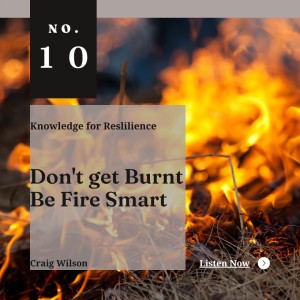
Tuesday May 31, 2022
Tuesday May 31, 2022
The topic of fire can stir up a lot of emotions. Even more important to talk about it well in advance and help reduce some of the unknowns that can cause anxiety around fire. When we talk about fire we are not just focused on wildfire but also cultural burning and prescribed burning which is actually more in tune with nature and can serve as one of the three ways to prevent a fire on your farm or ranch. Talk about fighting fire with fire!
Today’s guest is Craig Wilson, Co-founder and Operations Manager, at Mammoth Forestry. Craig started his working life on oil rig platforms across two continents, then worked as a rappel fire-fighter and air-crewman in Australia and now has been calling the Peace region home since 2012 when he joined the BC Wildfire Service as a smokejumper. Needless to say, Craig has had an experience or two with fire. Mammoth forestry is also delivering the Fire Smart program for the Peace River Regional District. Make sure you listen in on the full interview to learn how you can get a free home evaluation to help you protect your property from wildfire threats.
On this episode we are also giving a shoutout to Northline Equipment who can set you up with your farm equipment needs or help you fix the farm equipment you already have. Conveniently located in Pouce Coupe, give them a shout and they can help you out with all your equipment and equipment repair needs for your farm and ranch.
Helpful Links around fire prevention and management:
https://prrd.bc.ca/firesmart/
https://firesmartbc.ca/
https://firesmartcanada.ca/
https://www2.gov.bc.ca/gov/content/environment/air-land-water/air/air-pollution/smoke-burning/regulations/openburningregulation
https://firesmartbc.ca/farm-and-ranch-wildfire-preparedness/
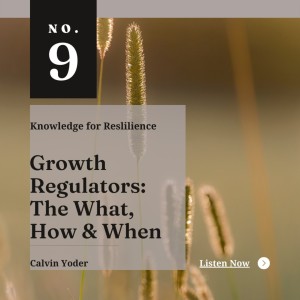
Friday May 27, 2022
Friday May 27, 2022
Whether you grow cereal crops or forage seed crops, you know that lodging can be a problem and reduce crop yields significantly. Growth regulators are products with the potential to reduce some of these issues. Although growth regulators have been around for a while, they were not commercially available in Canada until a few years ago. So there is still lots we don’t know about the effects of these products on forage seed crops grown in the Peace Region. Here to talk to us today about some of his latest research is Calvin Yoder. Calvin is a forage seed specialist conducting research trials in conjunction with SARDA Ag Research and the Peace Region Forage Seed Association.
Peace Region Forage Seed Association
http://www.peaceforageseed.ca
Growth Regulators in Grass and Legume Seed Crops - Overview
http://www.peaceforageseed.ca/pdf/SeedHeads/SH_9_PGR_Overview.pdf
SARDA Ag Research
https://sarda.ca
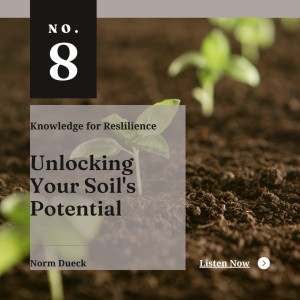
Wednesday May 11, 2022
Wednesday May 11, 2022
Norm has been involved in agriculture in the BC Central Interior, Bulkley Valley, Cariboo, Robson Valley and the BC and AB Peace region since 1999 as a Certified Crop Advisor and consultant for beef, dairy and grain farmers. HeartLand Soil & Crop Solutions was formed in July of 2015 while at the same time he represented DLF Pickseed from 2015 to 2018 and now is the A&L Canada Laboratories' Prairie Soil & Crop Specialist rep since the fall season of 2018. Over the years he has gained valuable knowledge working with lime, pulp mill sludge, wood ash and biosolids in on-farm applications as part of an in-depth fertility program. Norm currently lives in the Nechako Valley of Central BC, where he owns 150 acres of land which allows him the opportunity to put into practice some of the things he preaches.
Norm speaks as an independent consultant and has no ties to any companies that sell crop inputs to growers. Throughout our chat you will hear that he does not bring a company bias and speaks candidly about how we could fix some of our soil health challenges.
You can reach Norm at 250-570-1798 or by e-mailing
heartland.dueck@gmail.com
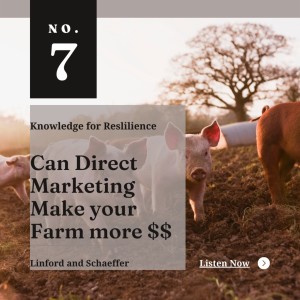
Friday May 06, 2022
Friday May 06, 2022
Two Peace Region producers, Darwin Lindford from RC Rafter Holdings and Michell Schaeffer from Whiskey Creek Ranch share some of their successes and challenges with direct marketing. Both operations use regenerative agriculture principles in their land and livestock management, run a range of livestock and are also members of the Small Scale Meat Producer Association.
Learn more about RC Rafter Holdings
http://dtlinford.com
https://www.facebook.com/rafterrcholdings/
Learn more about Whiskey Creek Ranch
https://whiskeycreekranch.ca
https://www.facebook.com/whiskeycreekranchroseprairie/about?ref=page_internal
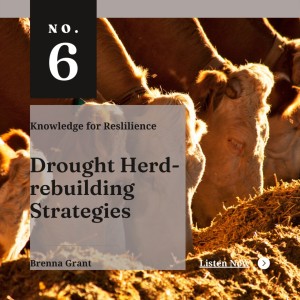
Thursday Apr 21, 2022
Thursday Apr 21, 2022
Today’s guest is Brenna Grant, research manager at Canfax. Brenna and her team spent some time looking at the realities of herd rebuilding which may be necessary after an event forces a higher-than-normal culling rate. She explains how your herd re-building strategies will not only have a very real impact on your bottom line and could lead to some tricky cashflow situation s but can also affect the running of an operation for many years, depending on how heavy the cull had to be, to make it through the pinch point.
Drought Rebuilding Strategies
https://www.canfax.ca/CRS/05%20Drought%20Rebuilding%20Strategies.pdf
BCRC Article on herd re-building
https://www.beefresearch.ca/blog/homegrown-heifers-or-bought-breeding-stock/
Canfax Research Services Factsheets
https://canfax.ca/FactSheets.aspx
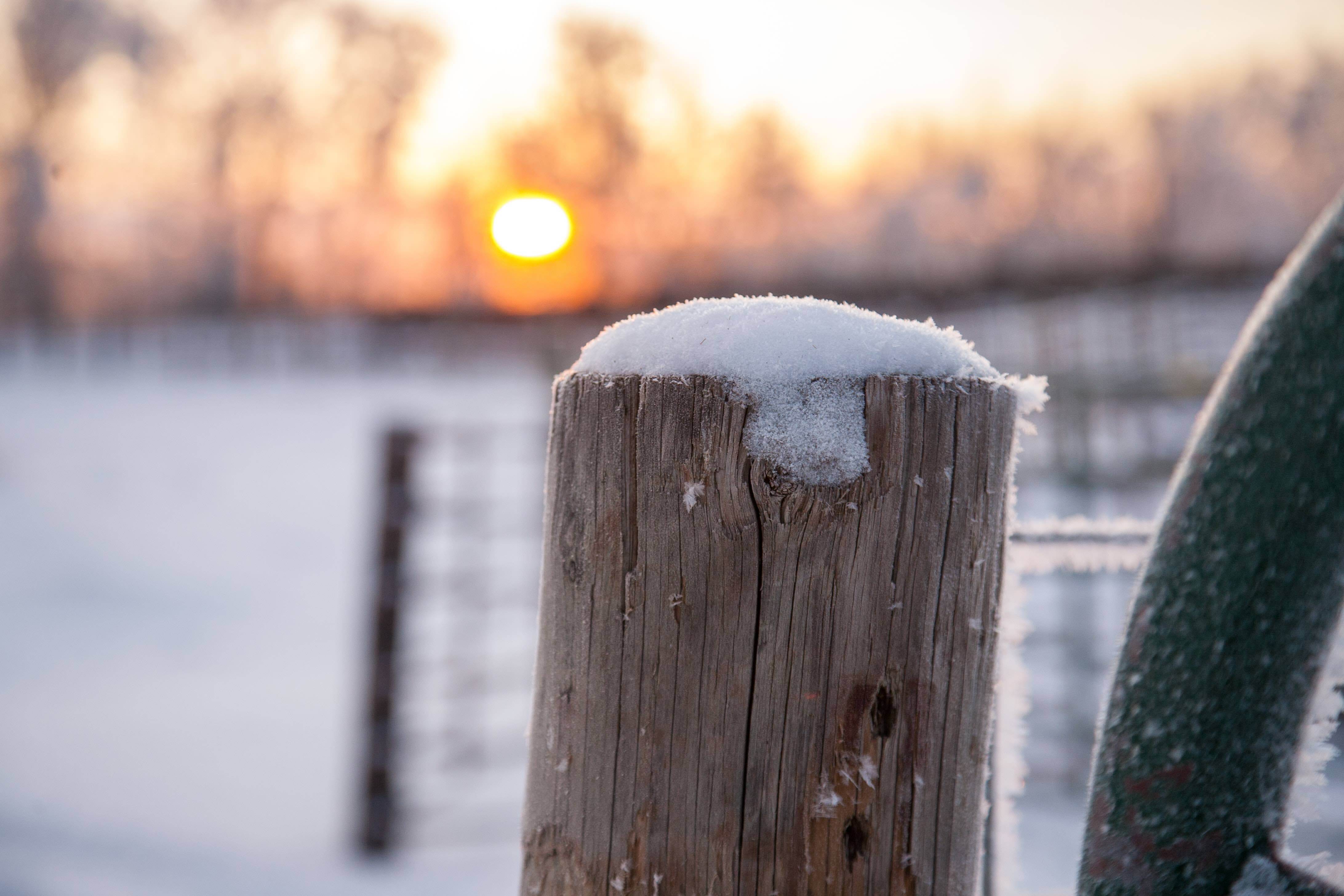
A Podcast for the Peace Region and Beyond
The Peace Region is rich in active producer and grower focused agricultural associations. To amalgamate our joint knowledge and foster cross-commodity collaboration towards our shared goal of building resilient and viable farming and ranching operations in the Peace Region, the Peace River Forage Association of BC (PRFA) is joining forces with the Peace Region Forage Seed Association (PRFSA), the BC Grain Producers Association and NEAT's Northern Cohort.
The project partner associations have a long standing history of bringing applied research, innovation and regionally adapted knowledge to a range of producers and growers. One limiting factor to move knowledge from research findings to farm applications, is the need for a bridge between the lab and the field. For example, if new research findings are published on reduced carbon emissions in no-till cropping systems, the information is likely first packaged in a scientific article. These articles are often locked behind paid journals and even if they are accessible, don’t make for the best bedtime reading material. Researchers on the other hand are busy proposing, implementing and analyzing their latest research, leaving little time and financial means to translate the scientific journal article into a format more easily consumable. Similarly, you may be curious about applied knowledge gathered by peers but may not have the opportunity to inquire for more details at the source. A podcast can offer a bridge between producers, specialists and researchers by packaging the information into a downloadable, on-the-go audio file.
Funding for this project has been provided by the BC Hydro Agricultural Compensation Fund.





